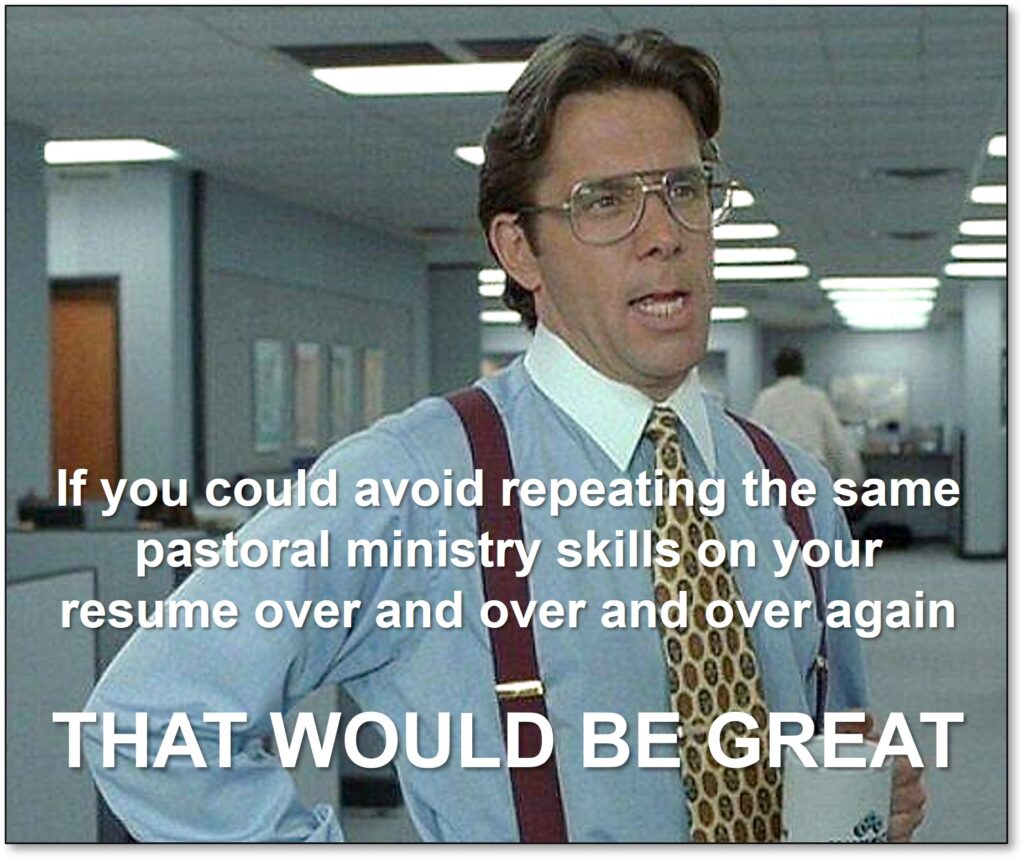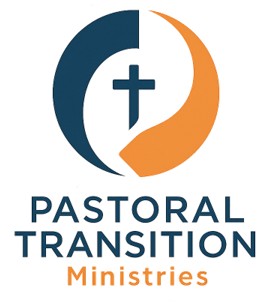
Tips for pastoral resume writing
When working in workforce development and career planning, I told my clients that the main purpose of the resume was to open the door for an interview. Your resume has the same purpose: give pastoral search committees the information they need to help them take the next step with your candidacy.
Resumes are the first document pastoral search committees review. First impressions—good or bad—are influenced by what you include in your resume and how you present yourself and your ministry experience.
Below are some practical tips for developing a clear and informative resume.

First things first: gather relevant information
Writing a résumé can be a challenge, but breaking it into smaller steps makes it easier. Here are key elements to include in each of the major sections of your resume.
Education
Draft a complete list of your educational attainments. For each entry, include:
The name of the college, university, or institution
The city and state where the organization is located
The degree earned and area of concentration or study
The year you completed the degree
At this stage, just stick to these basics.
Credentials
If you are ordained, indicate:
The name of the ordaining organization
The city and state where that organization is based
The year of ordination
Also list any professional certificates or licenses you hold (e.g. Peacemakers, Stephen Ministries, Clinical Pastoral Education, etc.), including:
The full title of each credential
The date it was issued
The current status of your credential (e.g., “active,” “expired,” “renewal pending”)
Experience
List any positions you’ve held that involved meaningful responsibility. For each job, include:
The name of the church, company or organization
The city and state where you worked
Your start and end dates (month and year are sufficient)
Your job or ministry title
Attributes
Develop a list of your personal attributes. Think of it this way, if I were to ask ten people who know you well to describe you, what would they say?
Format this into a bullet‑list of these attributes. This is not an exercise in self‑promotion. It is an opportunity to consider how you think others perceive your character and how you have demonstrated Christian values.
Selling yourself on your resume: the art of "Transferrable Skills"
Recently I connected with a pastoral candidate about his résumé. It was skimpy and lacked detail about his ministry experience. When I pointed this out, he said he wasn’t good at “selling himself”—a phrase I heard often in workforce development.
I get it. “Selling yourself” sounds like your bragging and you may wonder: if God is in control of this process, does one really need to “sell themselves”? The answer is yes—God is in control, and yes, you still need to sell yourself.
“Selling yourself,” simply means that you are documenting your skills and your effectiveness in demonstrating how those skills can be applied and transferred to a future ministry.
David & Goliath
The Bible has an example of this – David’s confrontation with Goliath in 1 Samuel 17.
Israel’s army was facing the Philistines. Goliath was their champion fighter who had come out time and time again to berate the armies of Israel. David approached King Saul and told him, “Let not man’s heart fail on account of him; your servant will go and fight with this Philistine.”
Saul was impressed with David’s courage, but he was not very enthused about his lack of battle experience.
“You are not able to go against this Philistine to fight with him; for you are but a youth, while he has been a warrior from his youth.”

David’s response is a classic example of “selling yourself.”
“Your servant was tending his father’s sheep. When a lion or a bear came and took a lamb from the flock, I went out after it, attacked it, and rescued it from its mouth; and when it rose up against me, I seized it by its beard, struck it, and killed it.”
David wasn’t bragging; he was identifying the skills he had, the actions he took, and the outcomes they produced. He was confident that those skills could be transferred and applied to the situation at hand. Saul was persuaded and the rest is history.
What does this look like on a resume?
Selling yourself on your resume all comes down to wording. Say too little, and your resume will appear skimpy and vague. Say too much, and it will look like you are bragging and over confident. Selling yourself is the sweet spot in the middle.
Here are a few guidelines and examples.
1. Express the actions you took as statements of fact.
Skimping
- Developed a Bible study.
Selling
- Developed a 12-week adult discipleship and ministry equipping course attended by 85% of church members.
Bragging
- I developed a well-received adult discipleship and ministry equipping course that everybody loved and appreciated, using principles I came up with all by myself.
2. Begin each statement with a verb indicating the action you took. Avoid starting with “I”.
Skimping
- Visited sick people.
Selling
- Organized a ministry of regular visitation and care for sick and shut-in members of the church family, averaging 10-12 connections each month.
Bragging
- I always went out of my way to visit sick people, making sure they knew how much I cared about them, and I always said the right thing which blessed everyone immensely.
3. When appropriate, add a numerical measurement to better demonstrate the scope of your actions or the impact they had.
Skimping
- Trained leaders.
Selling
- Partnered with Charis Ministries to implement a leader discipleship program that resulted in a 50% reduction in ministry leader attrition.
Bragging
- I shared my strong leadership skills with everybody in the congregation, giving them greater confidence to follow my vision for the church.

Selling yourself is a way to clearly and concisely communicate the actions you have taken and the desirable outcomes they have produced. It helps pastoral search committees better understand how God has been working in your life and ministry, and what that could look like in the future.

Please, I beg of you, on your resume, stop extending your margins to 1/8th of an inch to the edge of the page.
When you run your text right up to the edge of the page, it makes your resume
look like something a 6th grader wrote. I know you are trying to get more information on fewer pages, but having text that extends right to the edge of the page makes it look crowded and unprofessional. You would never do that with a report you’d give to your manager. Why do this on your resume?
For professional documents, such as a resume, use standard 1 inch margins for the top, bottom, left, and right.
OK, I feel better.
Differentiating one ministry from another






If you’ve been a senior/solo pastor in multiple churches, you likely carried out similar tasks in each ministry. It can be tempting to copy the bullet points from the first ministry and paste them, word for word into other ministry roles.
Please don’t do that.
Here’s the problem; it makes you look lazy and unprofessional.

People who review your résumé won’t know what to think.
- Are the skills repeated because you’re super focused and passionate about those areas of ministry? (Probably not!)
- Are they repeated because you were bored and uncreative when you were writing your resume?
- Are you stuck – have not grown or developed over your 20 years of ministry?
- Is the pastoral search committees going to think their church is next in line for your well-established but cookie-cutter approach to ministry.
How to differentiate pastoral ministries, even when they are very similar
Identify something unique about how a similar ministry skill was carried out in each location. For example, you may have led a discipleship program at First Community Church and one at Second Community Church. However, at First Community Church it was focused on leaders, while at Second Community Church it was focused on new believers.
Limit the number of bullet points for each ministry experience. You’re more likely to duplicate previously named skills if you list 10–15 bullet points for each church you served. (I suggest you keep it to six, eight at the most.)
Spread your skills across your various ministry positions. Reserve the most relevant—but duplicate—ministry skills for the church you served most recently.
Use your cover letter to highlight those areas of passion—ministry elements that align well with your spiritual gifting and the way God has wired you for ministry.
Several resume writing guidelines
 Formatting & Layout
Formatting & Layout
Font: Use a single, standard typeface (e.g., Arial, Calibri, Times New Roman), 10–12 pt for body text, with slightly larger (14–18 pt) for your name.
Margins: Keep them ≥ 1 inch on all sides so the document looks clean and uncluttered .
Color scheme: Keep text black only (no colors or graphics), unless you’re absolutely certain color is appropriate.
Single-column layout: Avoid multi-column formats—ATS scanners often cannot correctly extract the text.
 Typography & Punctuation
Typography & Punctuation
Consistency is key: Ensure all dates, fonts, spacing, bolding, underlining, and punctuation are uniform throughout.
Use bold, italics, and underlining sparingly, limited to headings or key items.
Bullets: Start with action verbs, keep them to 1–2 lines (max 3), and include no more than 5 per role .
Punctuation: Avoid over-punctuation. You can end bullets with periods, but be consistent .
 Headers, Footers & Page Setup
Headers, Footers & Page Setup
Name in footer + page numbers: Yes, put your name and page number in the footer on every page if more than one . Don’t place important info only in headers/footers—ATS may bypass them .
Name at top: Also include your name and key contact info at the top—larger and clear .
 Content Selection
Content Selection
Apply the “2 Rs Rule”: only include info that is Recent and Relevant—old, irrelevant details can hurt you .
Spell out uncommon abbreviations on first use .
 Proofreading & Validation
Proofreading & Validation
Have two people proofread for spelling, grammar, and consistency.
Test compatibility by emailing your resume (PDF) to friends to confirm correct formatting .
Use tools like AI assistants (e.g., MS Word CoPilot) for checking clarity, punctuation, and grammar—these are increasingly recommended.
 Format & Delivery
Format & Delivery
PDF format is strongly recommended to preserve formatting across devices and platforms .
For ≥ 2-page resumes, add your name and page number on each page .
Resume writing FAQ
Pastoral ministry is generally considered to be a professional role. The “shorter is better” resume writing rule that applies more informal roles does not always apply with pastoral resumes. Your resume should be long enough to communicate that you have the skills and experience needed for the position. However, if it is longer than three pages, it is going to start feeling wordy.
No. References take up valuable real estate on your resume and should be listed on a separate document. Also, don’t bother including “references sent on request” on your resume. Send them the same time as the resume.
Check the References link for tips on selecting your references.
I’m a fan of cover letters, but not everybody is. In my opinion, they provide an opportunity for you to tell more about yourself, why you are interested in the position, and why you are a good fit. A testimony document is also helpful.
For more information on both, check the Cover Letters link.
Personally, I don’t think they are necessary. In my opinion, in most cases, there is little value added by going to a professional resume writing service. There are ample resources online that provide common sense, best practices for resume writing.
If you chose to go with a service, keep in mind that there is no formula for the “perfect resume” and there is no guaranteed that you will get you the ministry placement of your dreams. Most of that is marketing hype.
If you were applying for a “secular” job, the answer would be “absolutely not!” However, ministry placement has a different set of expectations and protocols.
Including a picture on your resume or other document is considered appropriate and may even be expected. Make sure your photo is current, clear, and taken close enough so that all subjects can be easily seen.
MS Word documents can be edited giving reviewers opportunity to include notes. However, the benefit of PDF documents is their ability to retain formatting and they are universally accessible. Personally, I send PDF.
I recommend bullet point lists over paragraphs. Think of it this way. Your cover letter and personal testimony tell your story and paragraphs are best suited for that type of narrative.
Resume are more about making statements. Brief bullet points are best suited for this type of communication.
While 20 years is a benchmark, it really depends on relevance. As you look at your ministry and work history, you will reach a tipping point where the further back you go, the less relevant your skills and experience will be.
Ask yourself: “Does this ministry/work experience match the skills needed in the role I am applying for?” If not, leave it off.
Also, do yourself a favor and don’t clog up your resume with short term or part time work. (You may have loved your high school part time job at Taco Bell but it probably shouldn’t go on your ministry resume.)
Only if that is your highest level of education. If you have a bachelor’s degree or higher, leave it off. It is assumed that if you have a bachelor’s degree, you graduated from high school.
Personally, I’ve always thought GPA’s on a resume looked a bit tacky. (Maybe that’s because my GPAs have not always been something to write home about.) That said, include it only if it is 3.50 or above (on a 4.0 scale).
Ummm, let me think about that… NO! That would be a really dumb thing to do!
Nope! Anyone who tells you they have the guaranteed “job-landing” style of resume is full of skubalon.
